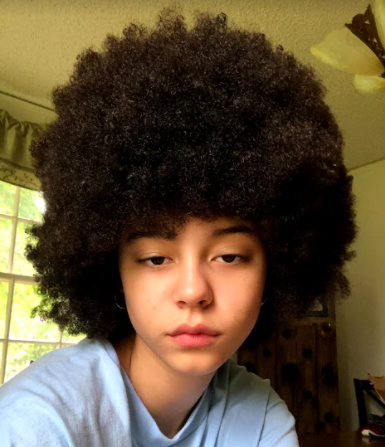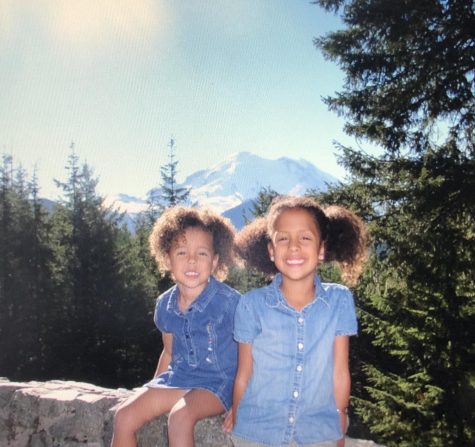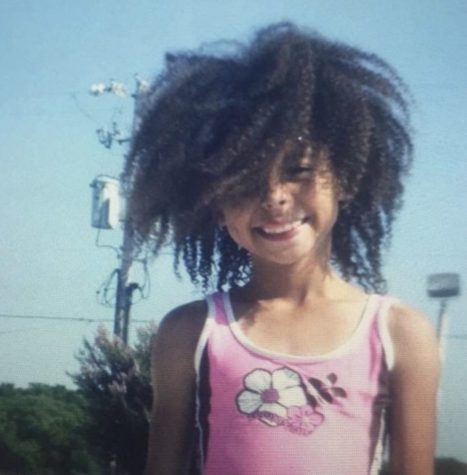No. You Cannot Touch My Hair.

December 16, 2020

When someone takes a brief look at my appearance, they usually have a comment to make about it. Their attention is mainly directed at my hair. Rarely do they say “I like your hair,” although their intentions may have been somewhere near the spirit of that statement. Typically they ask questions out of blunt curiosity like, “is that your real hair?” or “how long did it take to do that?” or, my least favorite, “can I touch it?”
I understand that those who take an explicit interest in my hair mean well–for the most part–but there is a layer of insensitivity and deep-seated judgment behind questions surrounding the image of Black women.
Growing up, my experience with my hair was a frustrating battle. So many girls like me have had the same struggle, and from a young age, turn to relaxers and straighteners to solve their problems. This is not to say that relaxed hair is not just as valid as natural hair. However, for a lot of us, our reasoning for pressing out our curls has not always been positive at its core.
Within the community even, there is separation between what is desirable or acceptable and what should be altered. Typically, the looser the curls fall, the better off one is seen. Black women with my type of hair that have kinkier and tighter curls are faced with a different set of obstacles.

Being bullied and receiving unwelcome attention because of our hair’s natural existence, is not an uncommon experience within the community. This issue generally is foreign to White, Latina/Latino/Latinx, Asian, Indigenous and other racial groups.
Movements from the Afro in the 60s, to the “No. You Cannot Touch My Hair” Campaign in more recent years, all speak to the shared experiences of Black men and women. Most Black girls have experienced the hair-touch moment, some of us most every day.
The act is invasive and dehumanizing.
Asking someone if their hair is theirs is yet another form of mindless disregard. This question in particular, poses the challenge that black women’s hair is unable to reach a certain length or be managed in a particular way. Not only that, it typically makes the person questioned feel extremely uncomfortable or offended.
In short, you do not need to know if my hair has ‘extensions’ or not.
For a lot of individuals, hair is a major part of self-confidence, expression and identity. Women in particular, take a lot of liberty in their hair, whether it be through bobs, dyed-roots, or buzz-cut shaved styles.
Black women even more specifically, have a deep and enriched culture with hair. Cornrows, box braids, and locs are all integral to our choices with style and functionality. Versatility in textured hair leads so many possibilities for different looks.

It has been a long journey though. From natural-hair discrimination at work, now made illegal in a few places, to the ignorance surrounding braided styles on little girls in school, deemed to be a violation of dress code, textured hair on Black women has never been more controversial.
To non-Black individuals who want to be socially-sensitive and aware, do some research! Learn about the history of styles you see in day-to-day life worn by Black women. There are plenty of resources to educate anyone who is willing to listen. All we want you to know, is that it is not our job to enlighten you on the specifics of our hair or hair styles.
As 2020 has brought on pivotal conversations surrounding social justice, Black women’s hair should be held up with just as much importance in the realm of social change and inclusivity. Awareness is everyone’s duty.
Vivian Potoa’e • Apr 2, 2021 at 6:31 pm
THIS!! thank you for bringing this up. you are absolutely right Carmella. it needs to be talked about more. so proud of you for your courage. i enjoyed reading this! you’re amazing.
Nicole Wolfs • Jan 28, 2021 at 10:08 am
This article is written beautifully! I was intrigued and moved by the insight to a topic that is extremely valid in todays landscape. Thank you for educating everyone, me included. I will move forward with this information and continue to be sensitive to all that goes with it.
GREAT READ 🙂
Nicole Wolfs, Lakes Cheer
Trisha Eargle • Jan 3, 2021 at 11:21 am
Camella,
I am so proud of you! It is not always easy to share truth; however, if we are willing to be real many are educated and you (me, we) become liberated!
Mrs. Eargle
Lakes School Counselor
Randy Wilson • Dec 18, 2020 at 1:26 pm
You are so awesome!
Thank you for sharing your amazing and incredible hair and making us think about our actions.
Please note: some of us are envious of your beautiful hair.
Robin Harrell • Dec 18, 2020 at 12:37 pm
Yes, yes, yes this!!!! Your writing is an inspiration for others and lends a voice to those who may not feel comfortable speaking up with a resounding , NO you may not touch my hair. Beautifully done!!
Kelsey Knowlton • Dec 18, 2020 at 10:06 am
Amazing to read this Carmella!!! Thank you for opening up about your experiences and sharing your feelings about this. Such a great piece.